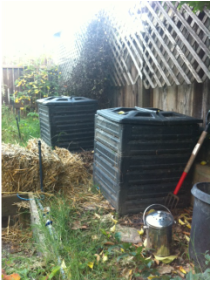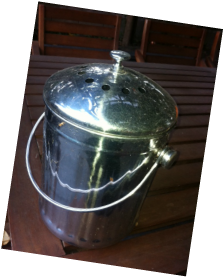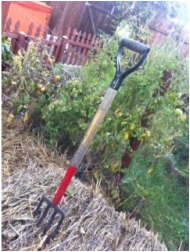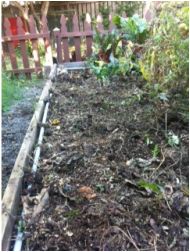Composting is one of the most efficient, green ways to run a household! First of all, you reduce your garbage by quite a bit. Secondly, you are providing yourself with environmentally friendly, free, safe fertilizer. WIthout replenishing the garden soil each year, you will not have healthy plump vegetables.
You do not have to be total gung-ho hippy to compost. I forget about it for weeks at a time, and then get all involved again. The good news, it everything keeps rotting whether you are paying attention or not! So here are a few hints to get your composting started. Ken Thompson wrote a cute little book called Compost if you are looking for more information. And as always, I would love questions!

~If you live in Sacramento, you can buy a stackable compost bin from the city of Sacramento for about $65 which is roughly half of what they retail for.
~You can also easily build one from scrap material laying around your yard. The key thing is that, the compost needs some air, and some barriers to hold in moisture. I would recommend having four side walls and a roof. The bottom can be left open so the nutrients can seep into the soil underneath the bin. We tried the "pile" thing and we ended up with a lot of dried material that never composted.

~You want your compost bin to have a balance. You should put any plant materials that are left over from cooking in your compost. I have this little "garbage can" in our kitchen for the compostable materials. It has an odor barrier on top so your kitchen won't smell. Coffee grounds (even still in the paper) are great for adding some acidity. You should put in yard clippings like grass or leaves. If you are going to put in sticks, cut them into small pieces or they take forever to break down. If you have lovely adorable chickens, you should put their wood shavings and poop from the coop, and the egg shells in the compost bin.
~Strive for a balance of these things so the pH stays at a good level (I don't know anything more about the science of it than that).
~Do not put meats, oils, or fats in you compost. They will attract unpleasant hungry animals, and the bin will smell like rotting meat. The compost should be primarily plant derived with the exception of some of the chicken "products" I mentioned above.

~About every two months the compost needs to be turned. If you have a stackable composting bin, then take the top layer and move it to a new, nearby location. Start moving the compost into this layer. This will make it so that they nutrients seeps into a different parcel of soil. If your bin then you may need to remove the top layer, mix things up , and put it back in.
~The goal in doing this is to move the composting materials to locations with different levels of air and moisture. It also keeps you from getting layers of material that are stuck together, or dried and they don't decompose. I leave this mini pitch fork by the bin and then it is always available when I get a whim to turn the compost. Lastly, turning your compost gives you access to the goods at the bottom!

~Once you get to the bottom of your bin and you find the gold, the stuff that smells like forest floor and it almost the consistency of crumbly dirt, spread it! In the spring before planting I till it in, but during the rest of the year, I simply spread it on the surface of the soil. It brings nutrients and replenishes the soil. The compost can also act as a weed and moisture barrier. It does amazing things for your garden, it is free, and it reduces your trash! Why would you not!
 RSS Feed
RSS Feed
